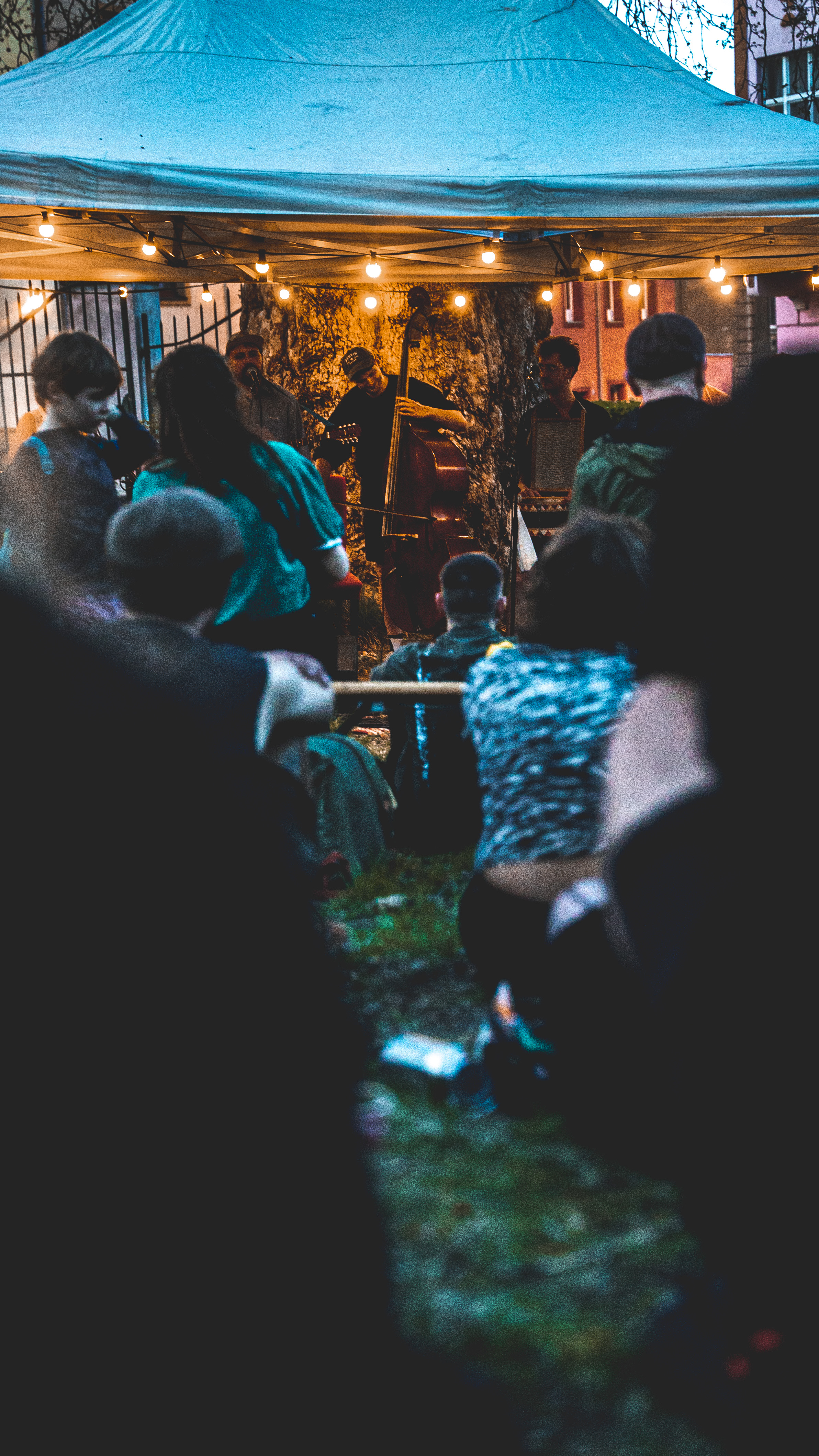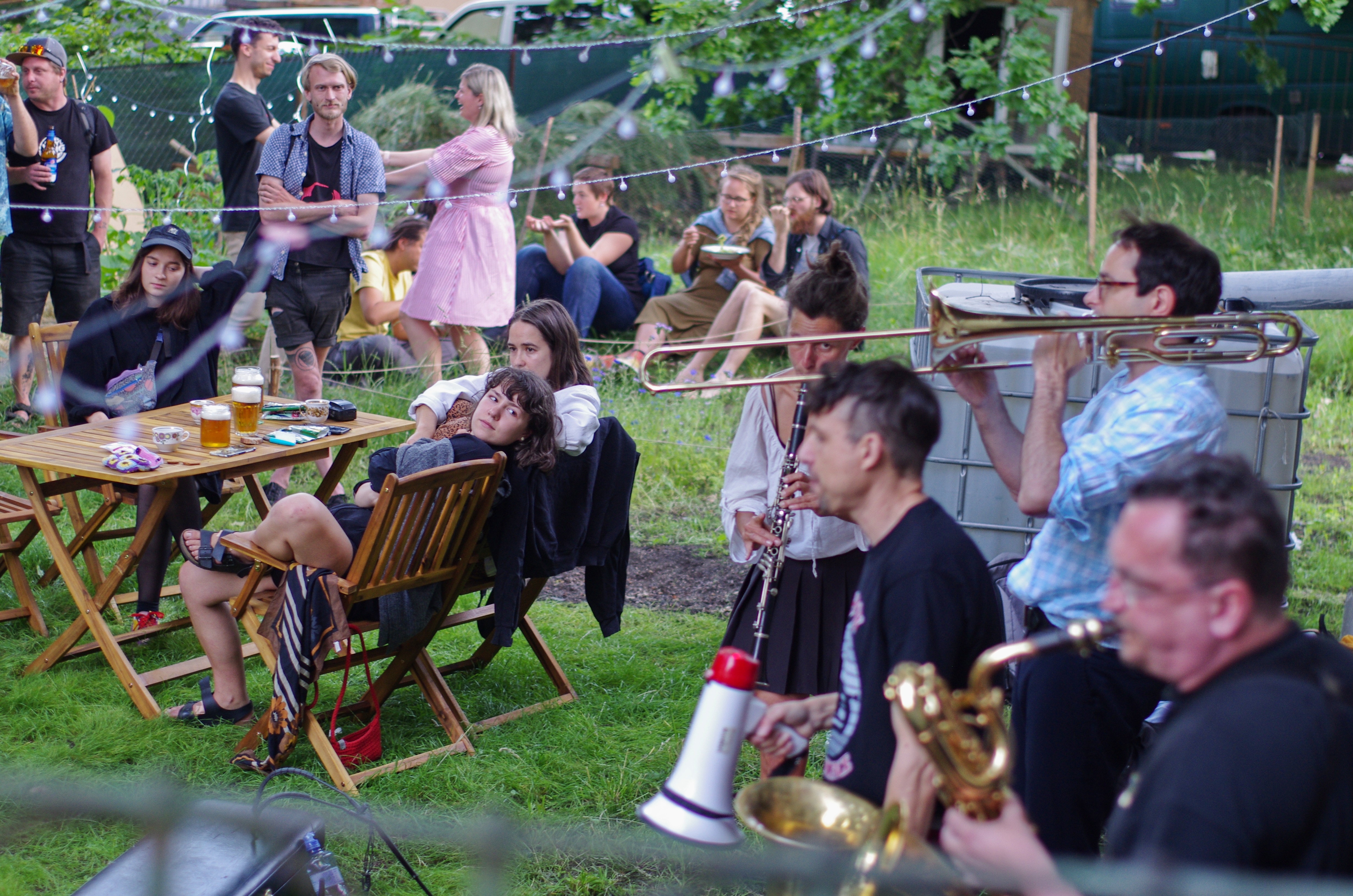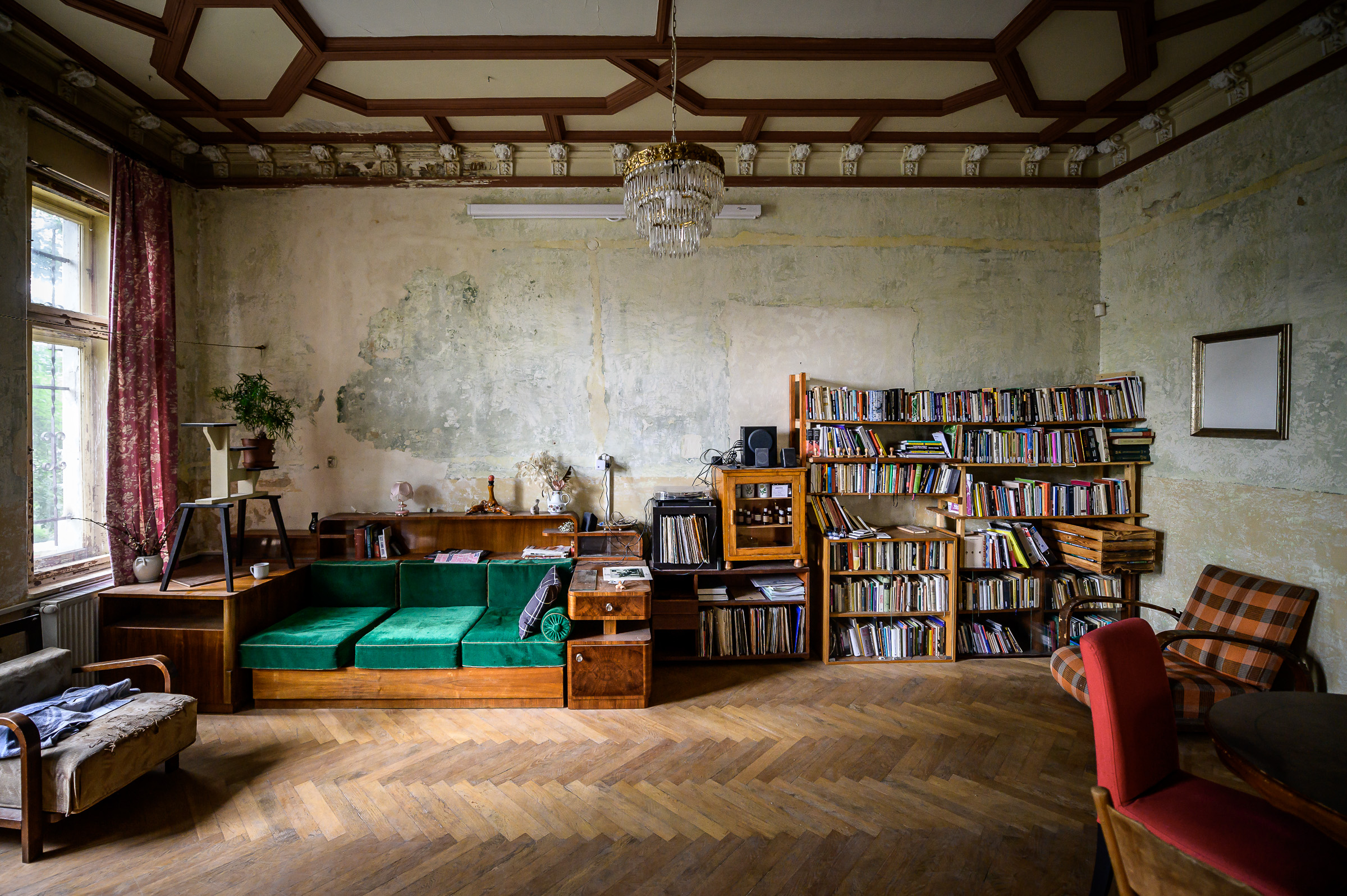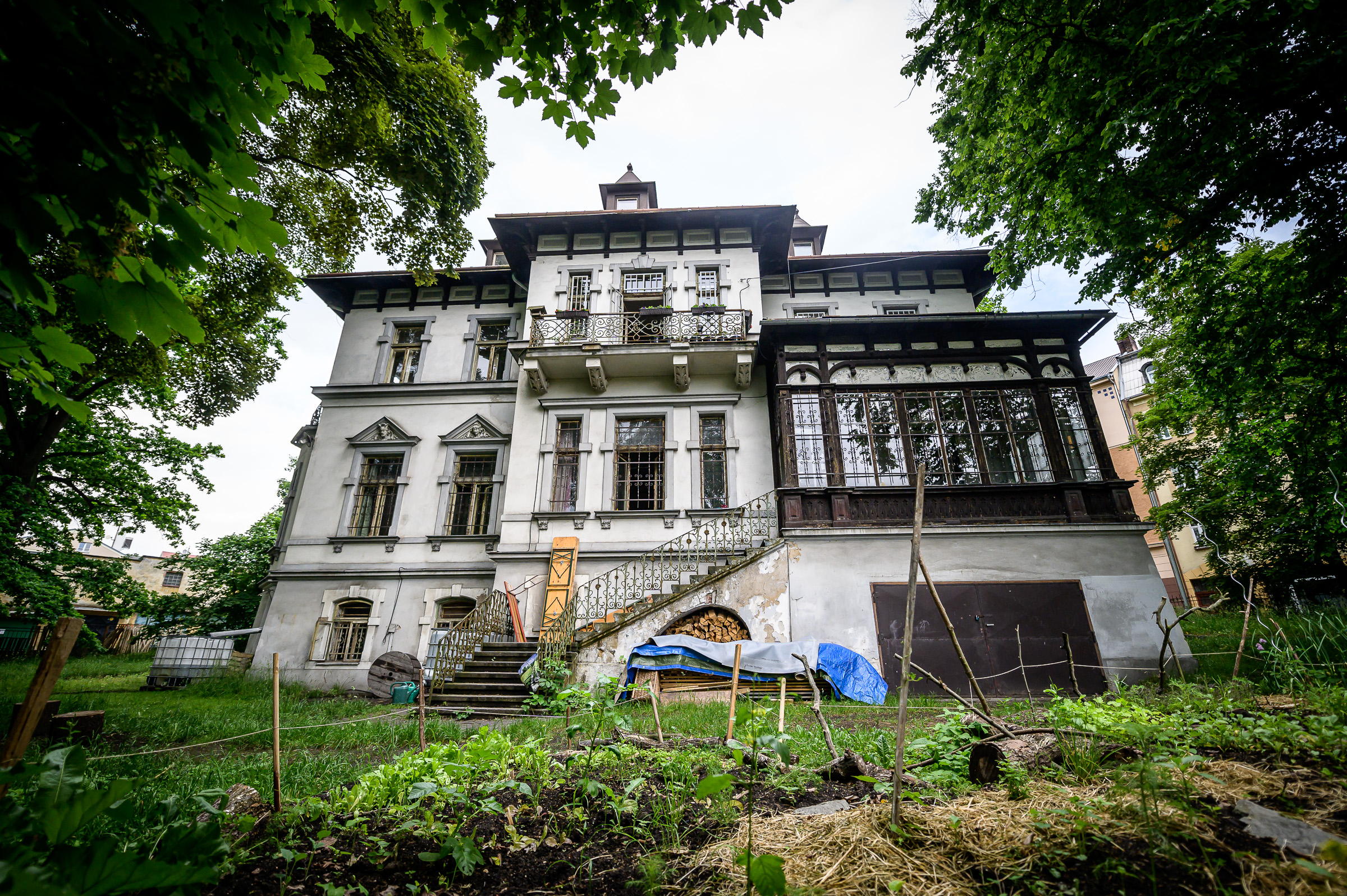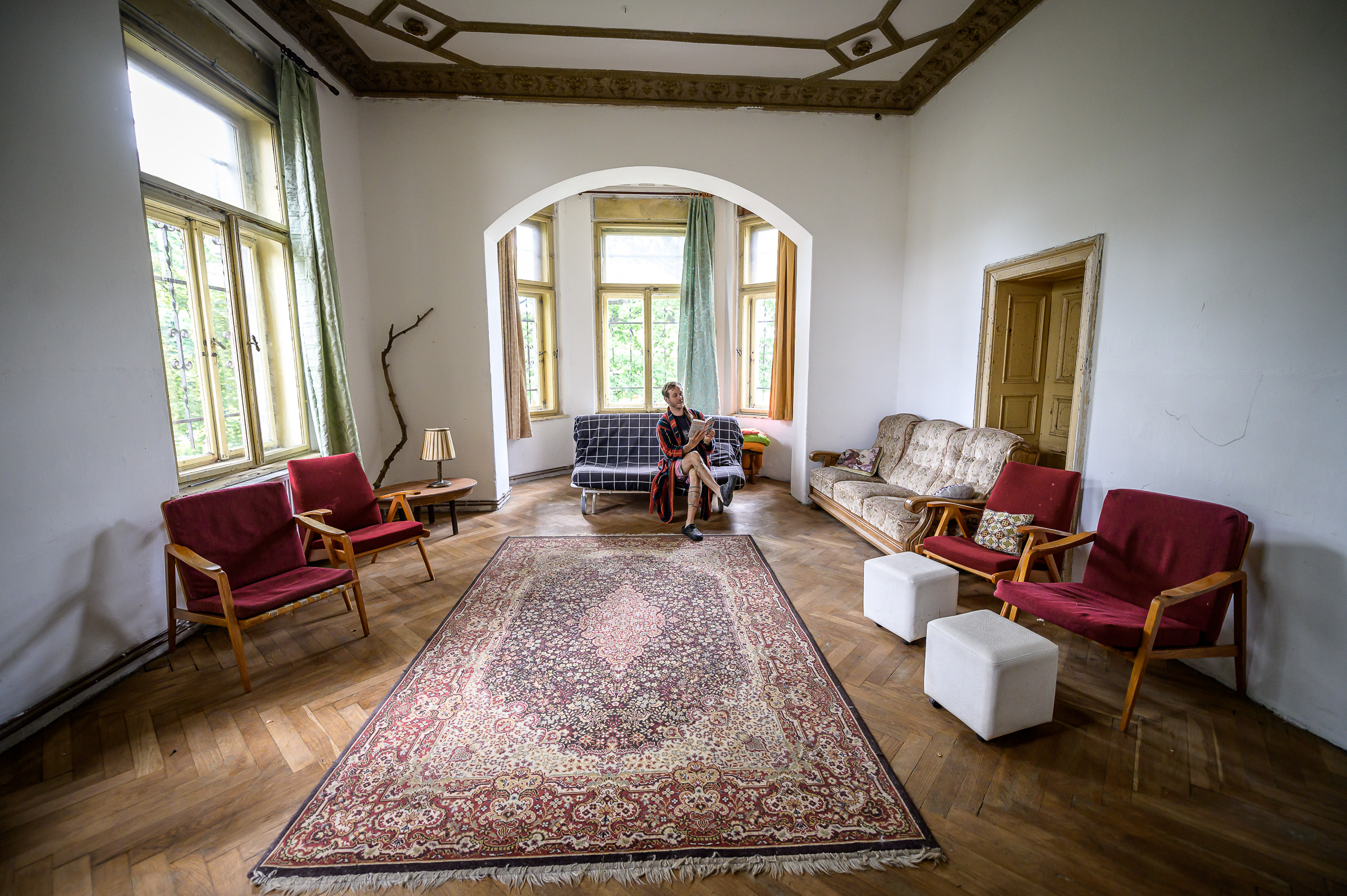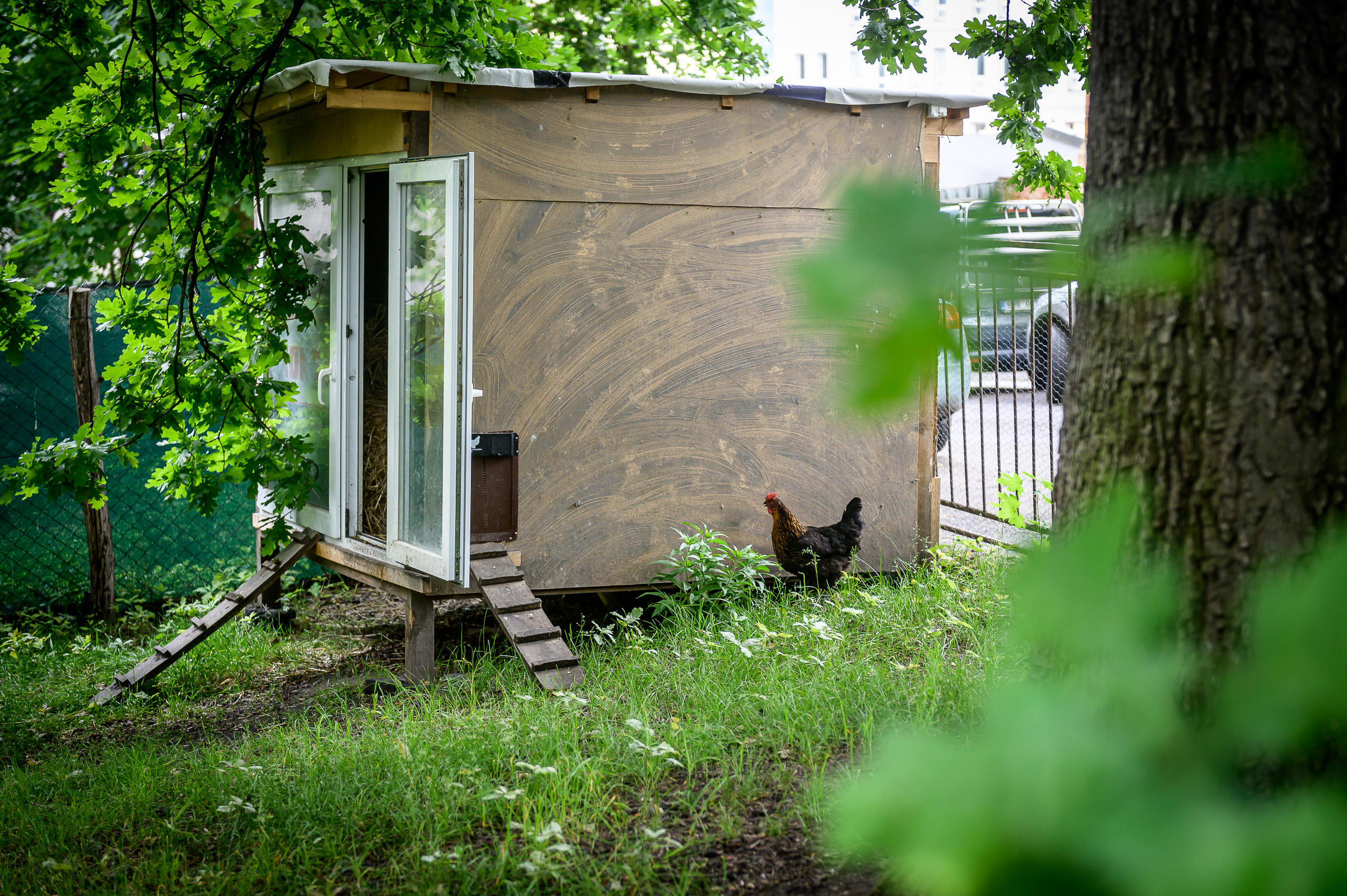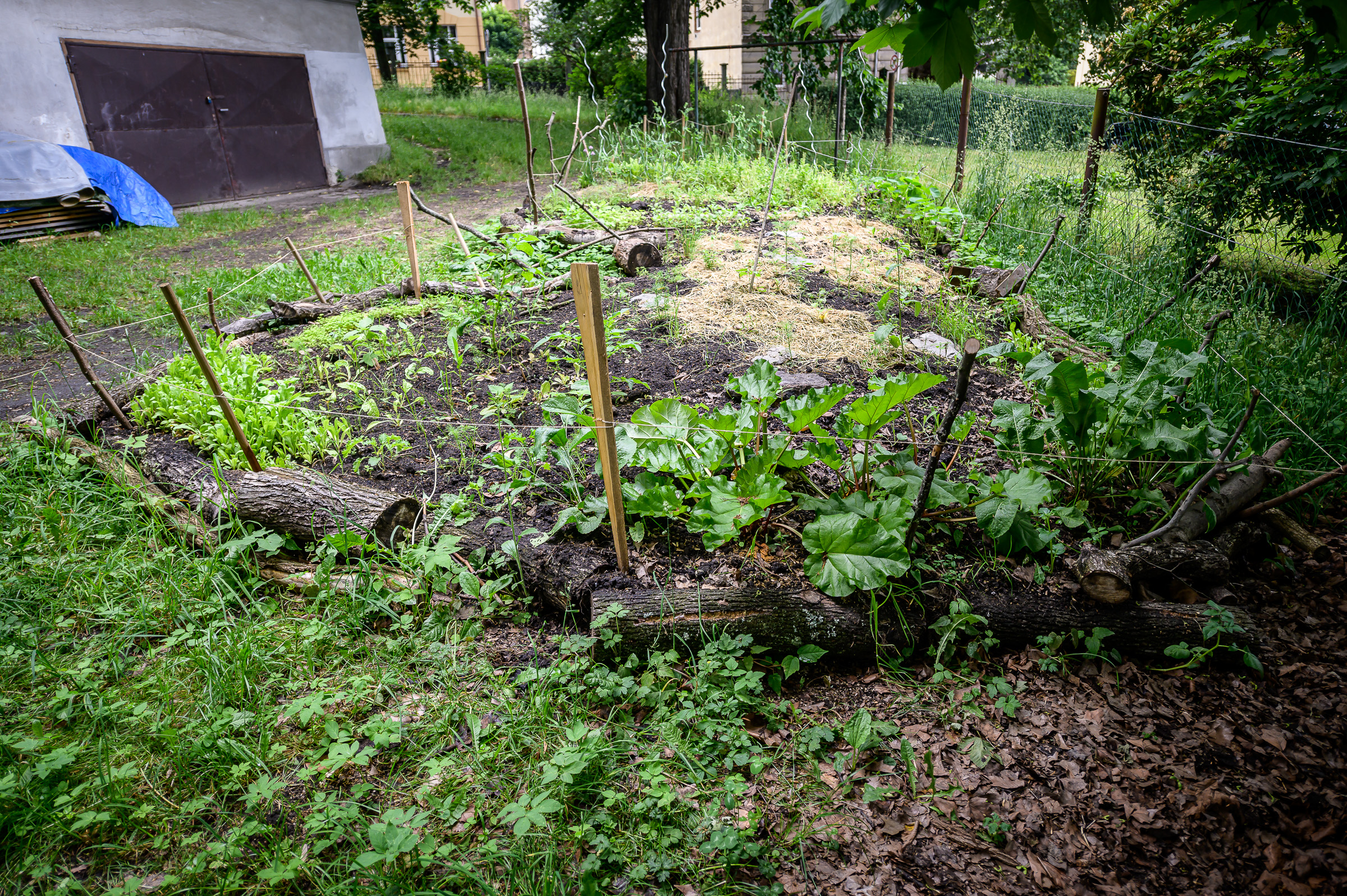Regaining a sense of belonging
Vzletný Racek - Socialní družstvo
social cooperation
We are a social cooperative that bought a house in Decin. We want to offer the house for various uses, to be a meeting place, to serve the community in the neighborhood, but also as a place to live. We are interested in the just transformation in the Ústí nad Labem region and in connecting culture, politics, activism and scientific research.
Czechia
Regional
Ústí nad Labem
It addresses urban-rural linkages
It refers to a physical transformation of the built environment (hard investment)
Yes
2022-04-01
No
No
Yes
No
Yes
As a representative of an organisation
The social cooperative Vzletný racek (Rising Seagull) operates a unique space in the jugendstil Villa Diana. The communal rooms and the garden are meeting places for the neighbourhood and beyond, and the private floor provides functions as a place for the members of the cooperative to live. We thrive on conviviality in events of various kinds, striving for collective resilience amid the multiple crises in the affected Ústí region.
The social cooperative Vzletný racek inhabitates villa Diana, originally the house of a chocolate factory owner Otto Rüger.
The aim was to provide dignified housing primarily for the cooperative members, young people born in various cities of the Czech Republic before their forties. The similarly important goal is to open the house and its garden to the various groups of the public: neighbours, people and initiatives from Ústí region as well as from other regions in the country and internationally. The region and the city of Dečín experience a current depopulation and have a vibrant history shaped by the expulsion of the German-speaking population after WW II. The following rise of industrialisation during socialist times was replaced by deindustrialisation during the liberalisation of the economy. As the region is structurally disadvantaged in the context of the Czech Republic, it offers an opportunity for a looming housing crisis experienced especially by young people in the productive age in the big cities. In the covid time, amid rising costs of living, our group emerged, and through direct loans, we have been able to purchase the object for the initial app. 280 000 €. Being aware of the multiple crises we wanted to build our resilience on the collective efforts and on functional relations with actors and people in the surroundings. Therefore we created an open meeting space with a low barrier entrance.
The uniqueness of our approach is the synergy between various strands of our activities; the characteristics are a DIY.
The social cooperative Vzletný racek inhabitates villa Diana, originally the house of a chocolate factory owner Otto Rüger.
The aim was to provide dignified housing primarily for the cooperative members, young people born in various cities of the Czech Republic before their forties. The similarly important goal is to open the house and its garden to the various groups of the public: neighbours, people and initiatives from Ústí region as well as from other regions in the country and internationally. The region and the city of Dečín experience a current depopulation and have a vibrant history shaped by the expulsion of the German-speaking population after WW II. The following rise of industrialisation during socialist times was replaced by deindustrialisation during the liberalisation of the economy. As the region is structurally disadvantaged in the context of the Czech Republic, it offers an opportunity for a looming housing crisis experienced especially by young people in the productive age in the big cities. In the covid time, amid rising costs of living, our group emerged, and through direct loans, we have been able to purchase the object for the initial app. 280 000 €. Being aware of the multiple crises we wanted to build our resilience on the collective efforts and on functional relations with actors and people in the surroundings. Therefore we created an open meeting space with a low barrier entrance.
The uniqueness of our approach is the synergy between various strands of our activities; the characteristics are a DIY.
network of social solidarity economies
community-based culture developement
affordable housing
making cities bikable
community garden
Most importantly we focus on the reconstruction of the house to enhance its efficiency. Due to limited financial resources, we DIY-insulated the windows, but we also switched the heating system from fossil gas to wood. Last year we renovated the leaking roof and insulated the attic of the house. Community housing also saves resources in terms of the common use of home appliances. We also have equipment for a bike repair workshop and possess a lot of bikes, which we regularly use.
We opened up a community garden for the public. During workshops, similarly we have opened the space of the villa for the collectives actively involved in public mobilisations for sustainability, such as climate movement. We also joined larger national mobilisations, such as Ukliďme Česko (Clean Czechia, garbage collection), or Týden pro Klima (Week for Climate). Our approach to sustainability is focused on smaller actions and events, that enable collaboration between various groups and involvement of the newcomers.
We opened up a community garden for the public. During workshops, similarly we have opened the space of the villa for the collectives actively involved in public mobilisations for sustainability, such as climate movement. We also joined larger national mobilisations, such as Ukliďme Česko (Clean Czechia, garbage collection), or Týden pro Klima (Week for Climate). Our approach to sustainability is focused on smaller actions and events, that enable collaboration between various groups and involvement of the newcomers.
We bought a historical jugendstil villa, which is, however, not a protected site. We equipped the interior of the public spaces mostly with secondhand furniture, which is functional yet aligned with the historicized atmosphere of the house and creates a unique feeling of comfortable grandparents ' living room. Some of the furniture was donated by the neighbours. The space is multifunctional and serves for public meetings as well as cultural programs. In the garden, several trees were partially planted at the time the house was built. We take great pride in this eco-cultural heritage and are doing the necessary work to take care of these trees. We also realized a permaculture garden that would be resilient in times of climate crises.
The cooperative Racek is generally open to everyone who is aligned with the general goals. However, we differentiate several working groups on particular issues. The most inclusive and low-barrier events are the annual Podmokly Cultural Day events, which are open to the neighbours as well as other visitors. These run on voluntary donations; last year, it was supported by the city of Decin, which covered the reimbursement for the music groups.
Our public premises are wheelchair-accessible, we were already happy to host the organization Ramus over. We see this as a starting point to further develop the physical accessibility of the villa.
The decision-making inside the cooperative works in a non-hierarchical way; we are inspired by the approach of Sociocracy. However, we are aware that this is not a given, and we keep getting ourselves educated on the topic.
We do not provide social work services tailored for a special social group; rather, we provide a space open to everybody and for mutual help. In times of multiple crises, we see this as an important instrument to create resilient communities.
Our public premises are wheelchair-accessible, we were already happy to host the organization Ramus over. We see this as a starting point to further develop the physical accessibility of the villa.
The decision-making inside the cooperative works in a non-hierarchical way; we are inspired by the approach of Sociocracy. However, we are aware that this is not a given, and we keep getting ourselves educated on the topic.
We do not provide social work services tailored for a special social group; rather, we provide a space open to everybody and for mutual help. In times of multiple crises, we see this as an important instrument to create resilient communities.
We opened the villa spaces to citizens. We invite everybody that is aligned to our general goals to realize their potential. However, more functional has been so far in the use of the space by already established collectives for their needs, such as strategy meetings. Our cooperative cooperates regularly with other cultural actors in the city of Děčín, such as Ukradená Galerie or the literary festival Zarafest. We mutually invite each other to our events, for example we invite artists to exhibit in the gallery, or hosted part of the program of Zarafest last year.
Our events not only entail a cultural program but also provide a casual meeting space for various groups, regional and international ones. As a project in the border region, we are also connected with various people and groups from Saxony/ Germany.
We have a community garden that is open to the neighbours. We share seeds, plants, space and food.
The villa is well-known in Decin, a lot of locals have associations and memories of it. By living in the villa as well as opening it to the public we are giving these memories a place in the present. We are happy to create a space for person-to-person storytelling that fulfils an emotional need in a world where displacement is a ubiquitous experience.
Our events not only entail a cultural program but also provide a casual meeting space for various groups, regional and international ones. As a project in the border region, we are also connected with various people and groups from Saxony/ Germany.
We have a community garden that is open to the neighbours. We share seeds, plants, space and food.
The villa is well-known in Decin, a lot of locals have associations and memories of it. By living in the villa as well as opening it to the public we are giving these memories a place in the present. We are happy to create a space for person-to-person storytelling that fulfils an emotional need in a world where displacement is a ubiquitous experience.
We collaborated closely with Sdílené domy, our umbrella organisation. It was absolutely crucial for the founding of our cooperative, the acquisition of the house and the financing model. With the city council, we have collaborated during Ukliďme Česko, informed them about the event and generally about our plans. The city partially financially supported the Podmokly Cultural Day in 2024. Mietshäusersyndikat and MOBA are also largely helpful. Regionally we are involved in the network Kreativní.UK, and it is helpful for our networking purposes.
The project has a DIY approach. We do involve experts but we mostly rely on our own knowledge and the knowledge of local networks. For the community garden, we implemented permaculture and the collective knowledge of our members on matters of landscape design, permaculture, arboriculture and biodiversity that had to be implemented. Since we mostly relied on knowledge amongst ourselves we developed the ideas on-site in the form of a work group. The challenges of climate change are a crucial topic to us. Developing a multi-leveled resilient response is of high importance to us and is reflected in our garden design. We implemented a system of rainwater distribution to respond to present and future issues of water scarcity.
We collaborated closely with Sdílené domy, our umbrella organisation.It was absolutely crucial for the founding of our cooperative and acquisition of the house, as well as the financing model. With the city council, we have collaborated during Ukliďme Česko, informed them about the event and generally about our plans. The city partially financially supported last year the Podmokly Cultural Day. Mietshäuser syndikat and Moba are also largely helpful. Regionally we are involved in the network Kreativní.UK and we think this will be helpful for us for networking purposes.
Although in the initial phase, we tried to contact regional counsellors and institutions (such as Czech railways) for possible long-term leases of a brownfield or real estate, we were not successful. Neither banks nor financial institutions were helpful for the initial investment. Therefore, we acquired the necessary capital from direct loans, some from some of the members of the cooperative.
We collaborated closely with Sdílené domy, our umbrella organisation.It was absolutely crucial for the founding of our cooperative and acquisition of the house, as well as the financing model. With the city council, we have collaborated during Ukliďme Česko, informed them about the event and generally about our plans. The city partially financially supported last year the Podmokly Cultural Day. Mietshäuser syndikat and Moba are also largely helpful. Regionally we are involved in the network Kreativní.UK and we think this will be helpful for us for networking purposes.
Although in the initial phase, we tried to contact regional counsellors and institutions (such as Czech railways) for possible long-term leases of a brownfield or real estate, we were not successful. Neither banks nor financial institutions were helpful for the initial investment. Therefore, we acquired the necessary capital from direct loans, some from some of the members of the cooperative.
The project is completely new because something like a social cooperative didn’t exist before in the Czech Republic. We are responding to the housing crisis in a way that combines and culminates different approaches. Firstly the villa belongs to the cooperative as well as to the Shared houses network and therefore can not be sold. We’re practically demonstrating that housing is not a commodity but serves the people living in it. The shares of the house are equally distributed amongst members and cannot be sold or inherited. We set up ways of decision-making in a non-hierarchical way that we continue to develop with time.
Community, cooperative housing is not a new idea, yet in the Czech Republic, we are a pioneering project. The communist legacy to this day holds rather unfavourable perceptions of collective forms of living and economic activity. However, the combination of cultural events and sustainability efforts creates a unique atmosphere.
Community, cooperative housing is not a new idea, yet in the Czech Republic, we are a pioneering project. The communist legacy to this day holds rather unfavourable perceptions of collective forms of living and economic activity. However, the combination of cultural events and sustainability efforts creates a unique atmosphere.
Our approach is typical the use of all available materials and possibilities to collaborate. It could be characterised by the joyful effectivity, with a limited financial resources we aim at creating the opportunities for meetings of various social groups, or to use a space.
Together with the MOBA network, we are developing models for affordable bottom-up housing for different countries in Central Europe and the Balkans. With the Shared Houses Network, we set up a working system that is ready to be adopted by other projects in the Czech legislative frame. Racek serves as a living example and a playground for testing different methods in practice to see if they can stand real-life circumstances.
Together with Sdílené domy, we published a brochure for new projects and created a video. Similarly, we have contributed to the participatory housing project.
The financial aspect of direct loans, as well as the administrative aspect of establishing the cooperative, are widely disseminated.
Similarly, we share our experience with the internal functioning of the cooperative with collectives interested in establishing similar projects.
In light of the current housing crisis in the Czech Republic, we can observe an interest in our project from various media – during the three years, we introduced our project to 6 media outlets.
Together with Sdílené domy, we published a brochure for new projects and created a video. Similarly, we have contributed to the participatory housing project.
The financial aspect of direct loans, as well as the administrative aspect of establishing the cooperative, are widely disseminated.
Similarly, we share our experience with the internal functioning of the cooperative with collectives interested in establishing similar projects.
In light of the current housing crisis in the Czech Republic, we can observe an interest in our project from various media – during the three years, we introduced our project to 6 media outlets.
Currently, we observe a growing demand for decent, affordable housing globally. Our project demonstrates a viable alternative to living in a nuclear family and a novel approach to cooperative housing. Social cooperative Racek serves as a practical example of a grassroots, self-organised response to the housing crisis. It provides affordable housing to its members and develops methods that can be applied to new, potentially emerging projects.
Similarly, it could be an inspiration for regional development in the structurally disadvantaged, post-industrial regions, such as the Ústecký region. It provides an impulse for a just transition in the broader sense as an idea to enhance the capabilities of cooperation and bottom-up collective action.
The key underlying global crisis we face is climate change. Our response to the current and future risk of extreme weather events and stress to supply chains to build social ties for collective resilience that allow people to grow mutual trust and the ability to act collectively. Therefore it is a key for us to offer space to collectives and initiatives already involved in the efforts of emissions mitigation, but also to join events such us Week for climate (Týden pro klima), or Clean Czechia (Ukliďme Česko), that allow us to network with other active people.
Similarly, it could be an inspiration for regional development in the structurally disadvantaged, post-industrial regions, such as the Ústecký region. It provides an impulse for a just transition in the broader sense as an idea to enhance the capabilities of cooperation and bottom-up collective action.
The key underlying global crisis we face is climate change. Our response to the current and future risk of extreme weather events and stress to supply chains to build social ties for collective resilience that allow people to grow mutual trust and the ability to act collectively. Therefore it is a key for us to offer space to collectives and initiatives already involved in the efforts of emissions mitigation, but also to join events such us Week for climate (Týden pro klima), or Clean Czechia (Ukliďme Česko), that allow us to network with other active people.
The cooperative focused primarily on securing decent housing, which was achieved in the spring of 2024 by certification from the building authority. This cooperative form of ownership is the rare new functioning case in the post-socialist space, where community-based models faced detrimental public defamation after 1989.
Apart from the housing, our results can be counted in the public events organised in the villa Diana, out of which the most popular event is a summer neighbourhood party that we named Podmokly Cultural Day last year. Approximately a hundred participants attended the event, which mirrored the social ties of our cooperative across the neighbourhood, region, and beyond. It is a truly unforgettable atmosphere of belonging between diverse social groups that would unlikely meet and celebrate together on one place. The more valuable it is in the region, the more it is often claimed to be uprooted and displaced due to historical shifts in population.
This annual event would not be successful without continual organisation of smaller events by the cooperative members as well as in collaboration with other groups and initiatives. Similarly, we build connections to different collectives while offering them a suitable space for their meetings.
The previously empty and abandoned building thus gets a new life, and together with the people who joined the efforts on reconstruction during the brigades, help it to thrive. We estimate that hundreds of people visited the house and worked thousands of working hours there.
Apart from the housing, our results can be counted in the public events organised in the villa Diana, out of which the most popular event is a summer neighbourhood party that we named Podmokly Cultural Day last year. Approximately a hundred participants attended the event, which mirrored the social ties of our cooperative across the neighbourhood, region, and beyond. It is a truly unforgettable atmosphere of belonging between diverse social groups that would unlikely meet and celebrate together on one place. The more valuable it is in the region, the more it is often claimed to be uprooted and displaced due to historical shifts in population.
This annual event would not be successful without continual organisation of smaller events by the cooperative members as well as in collaboration with other groups and initiatives. Similarly, we build connections to different collectives while offering them a suitable space for their meetings.
The previously empty and abandoned building thus gets a new life, and together with the people who joined the efforts on reconstruction during the brigades, help it to thrive. We estimate that hundreds of people visited the house and worked thousands of working hours there.

